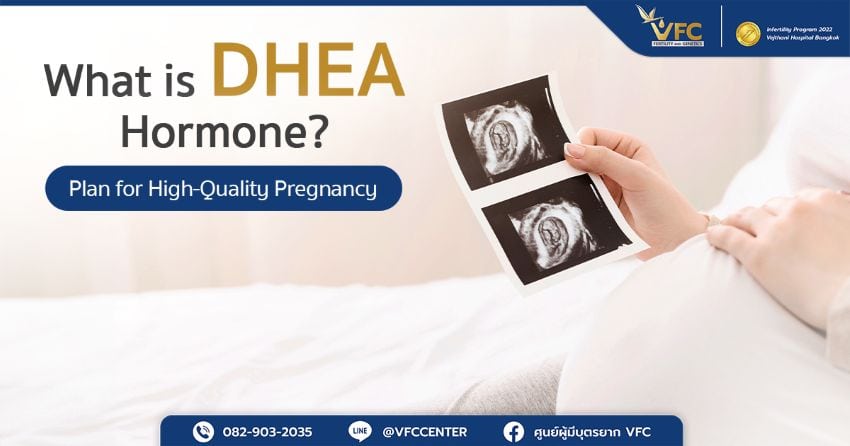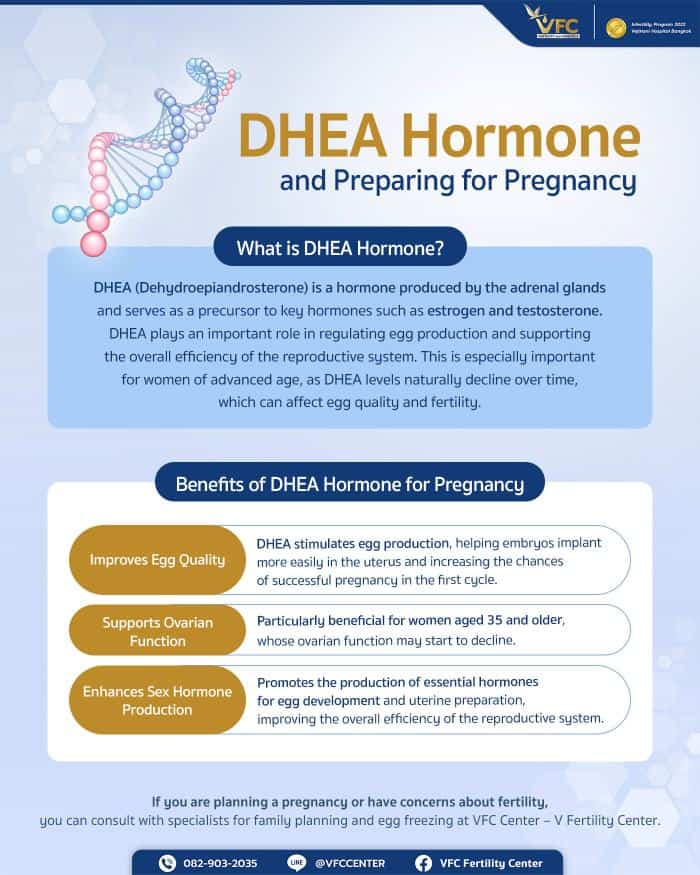
The DHEA hormone plays a critical role in enhancing female fertility, especially for women over 35 who may experience a decline in egg quality and ovarian function. Produced naturally by the adrenal glands, DHEA acts as a precursor to sex hormones like estrogen, supporting healthy egg development and reproductive balance. Low DHEA levels are often linked to poor egg quality and reduced chances of conception. That’s why female egg quality testing and DHEA monitoring are essential parts of fertility planning.
For those trying to conceive, especially at a later age, DHEA supplements, alongside other vital nutrients like vitamin D and folic acid, may improve reproductive health and increase the chances of a successful pregnancy.

Having children is a dream for many couples, but not all can achieve a successful pregnancy easily. Women of advanced maternal age often face additional risks, making female egg quality testing an important step in preconception planning. This testing helps evaluate ovarian health and reproductive hormones, including DHEA hormone, which plays a vital role in enhancing egg quality and overall reproductive potential.
What is DHEA Hormone?
DHEA (Dehydroepiandrosterone) is a hormone produced by the adrenal glands. It serves as a precursor for key hormones in both men and women, such as estrogen and testosterone. DHEA hormone plays a crucial role in regulating egg production in the ovaries and supporting reproductive system function for both sexes.
Low DHEA levels in women can impact egg health, quantity, and fertility. This is especially significant for women over 35, as natural DHEA levels decline with age, potentially making conception more challenging. Monitoring DHEA levels is therefore essential for pregnancy planning, as it can indicate potential fertility risks.
Benefits of DHEA Hormone for Pregnancy
Understanding the benefits of DHEA hormone helps couples prepare effectively for conception and increases the chances of a successful pregnancy.
1. Improves Egg Quality
DHEA stimulates egg production in the ovaries, which is essential for preconception readiness. High-quality eggs can develop into healthy embryos, improving implantation success and increasing the likelihood of conceiving on the first attempt.
2. Supports Ovarian Function, Even in Older Women
As mentioned, DHEA is crucial for ovarian stimulation. It is especially beneficial for women over 35 whose ovarian function may have declined, as well as younger women with a lower-than-normal egg count. Supplementing DHEA can enhance reproductive efficiency.
3. Enhances Sex Hormone Production
DHEA stimulates production of reproductive hormones such as estrogen, which is vital for egg development and preparing the uterus for embryo implantation. This is particularly helpful for women with low sex hormone levels or those experiencing difficulties with egg production.
Why Female Egg Quality Testing is Important
As women age, egg production and fertility potential decline due to lower egg quality, which can affect embryo development. Female egg quality testing is crucial for identifying potential issues, guiding treatment decisions, and planning conception effectively.
- Low DHEA levels can negatively impact egg quantity and quality, reducing chances of conception.
- Supplementing DHEA may improve egg quality by enhancing ovarian function.
- Maintaining optimal DHEA levels improves egg quality, increasing fertilization potential.
Female egg quality testing is particularly important for women planning pregnancy at an older age to ensure egg health and a smoother conception process.

Women’s Supplements for Pregnancy Preparation
In addition to egg health testing, maintaining overall health and proper nutrition is vital for women planning pregnancy. Adequate intake of vitamins and minerals directly affects fertility readiness. Key vitamins for women aiming to conceive include:
1. Vitamin D
Vitamin D is essential for female reproductive health, especially during preconception. It supports hormone production, including estrogen and progesterone, which prepares the uterus for embryo implantation. Vitamin D also strengthens bones and immunity, reducing the risk of miscarriage and pregnancy complications. Low vitamin D can negatively affect ovarian function, reducing egg quality and fertilization chances
2. Folic Acid
Folic acid, a type of B vitamin, is critical during early pregnancy. It helps prevent genetic defects such as spina bifida and promotes proper fetal development. Adequate folic acid intake supports healthy embryo growth
3. Vitamin E
Vitamin E is an antioxidant that protects cells from damage caused by free radicals, which is important for egg health and embryo development. It also boosts immunity and reduces pregnancy complication risks.
4. Vitamin C
Vitamin C enhances immune function, helping prevent infections during pregnancy. It improves iron absorption, which is crucial for blood production and fetal development, and protects cells from free radical damage during gestation.
Proper supplementation of these vitamins not only strengthens egg quality and reproductive health but also increases the likelihood of a successful and healthy pregnancy.
For women planning pregnancy after 35, female egg quality testing and appropriate women’s supplements are essential. Proper self-care and preparation significantly improve chances of conception and reduce pregnancy risks. Women considering fertility planning before 30 can consult about egg freezing at VFC Center (V Fertility Center), an icsi clinic which provides personalized guidance and comprehensive fertility care from experienced obstetricians.
Frequently Asked Questions:
What is DHEA and how does it help with fertility?
DHEA (Dehydroepiandrosterone) is a natural hormone that helps produce estrogen and testosterone. In women, DHEA supports egg development in the ovaries and improves ovarian function. Taking DHEA supplements can enhance egg quality, particularly in women with low ovarian reserve or those over age 35, increasing the chance of successful fertilisation.
Why should women get their egg quality tested before trying to conceive?
Female egg quality testing helps evaluate ovarian health and hormone levels, including DHEA. This testing is especially important for women over 35 or those who’ve had difficulty conceiving. Identifying low-quality eggs early allows doctors to recommend the right treatments or supplements to improve fertility outcomes.
Can DHEA supplementation really improve egg quality in older women?
Yes, DHEA supplementation has been shown to improve egg quality, particularly in women of advanced maternal age. By boosting ovarian function and hormone production, DHEA can increase the chances of producing healthy eggs that are suitable for fertilisation and embryo development.
What other supplements support women’s fertility besides DHEA?
Vitamins such as folic acid, vitamin D, vitamin E, and vitamin C are essential for fertility. These nutrients help regulate hormones, protect reproductive cells, support embryo development, and reduce complications during pregnancy. Combined with DHEA, these supplements can strengthen reproductive health before conception.
At what age should women consider egg freezing or fertility consultation?
Women over 35 who are planning to delay pregnancy should consider egg freezing as a proactive step. However, fertility consultations can begin earlier—ideally in the late 20s or early 30s—for women who want to explore their reproductive health, hormone levels, and plan ahead with expert guidance.
Article by DR. WANAKAN SINGHASENA
Contact us for inquiries or appointments:
VFC Center – V-Fertility Center
Hotline: 082-903-2035
LINE Official: @vfccenter

OBSTETRICS AND GYNAECOLOGY-REPRODUCTIVE MEDICINE





No Comments
Sorry, the comment form is closed at this time.